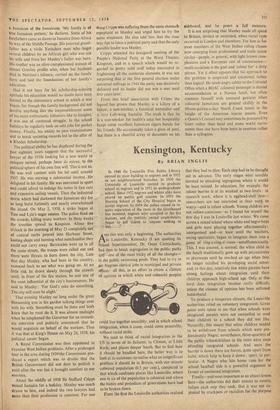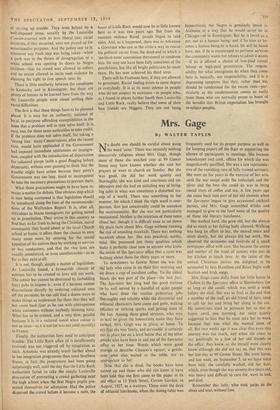Kensington, Kentucky
By BRIAN INGLIS In 1948 the Louisville Free Public Library opened its main building to negroes and in 1952 its ten neighbourhood branches. In 1950 the University of Louisville opened its graduate school to negroes and in 1952 its undergraduate school. Since 1952 negroes and whites alike have played on public golf courses. In 1953 the Nursing School of the City Hospital began to accept negroes. In 1954 the police ceased to re- quire separation of the races in the Greyhound bus terminal, negroei were accepted at the fire stations, and the publicly owned amphitheatre began to sell tickets, to 'anyone wishing to buy. . .
AND this was only a beginning. The authorities in Louisville, Kentucky (I am quoting its School Superintendent, Dr. Omer Carmichael), had then to break segregation in the public parks and—one of the most tricky of all the changes— in the public swimming pools. They had to try to get Negroes clerical jobs in municipal and private offices : all this, in an effort to create a climate of opinion in which white and coloured peoples could live together amicably; and in which school integration, when it came, could come peaceably, without racial strife.
We tend to think of racial integration in the US in terms of its failures; in Clinton, at Little Rock, and places deeper South. But to find how it should be handled here, the better way is to look at its successes: to realise what an insignificant problem it should be in Britain, with our minute coloured population (0.5 per cent.), compared to that which confronts places like Louisville, where one in six of the population is coloured and where the habits and prejudices of generations have had to be broken down.
From the first the Louisville authorities realised that they had to plan. Each step had to be thought out in advance. The early stages were sensibly devoted to attacking segregation where it would be least missed. In education, for example, the colour barrier is at its weakest at two levels : in research work, where it is egghead-shell `thin— researchers are too interested in their work to worry—and in infant schools. Young children are not colour-conscious—as I found for myself the first day I was in Louisville last winter. We came across a mixed school where white and negro boys and girls were playing together affectionately: unorganised and—at least until the teachers, seeing spectators, began to integrate them into a game of ring-a-ring-o'-roses—unselfconsciously. This, I was assured, is normal; the white child in the South traditionally grew up with piccaninnies as playmates until he reached an age when they no longer satisfied his developing social sense; and, to this day, relatively few white parents have strong feelings about integration until their children approach high-school age. Only at this level does integration become really difficult; unless the climate of opinion has been softened beforehand.
To produce a temperate climate, the Louisville authorities relied on voluntary integration. Great pains were taken to see that when schools were integrated parents were not compelled to send their children to a school they did not like. Naturally, this meant that white children tended to be withdrawn from schools which were pre- dominantly Negro; nevertheless, three-quarters of the public schoolchildren in the town were soon attending integrated schools. And once the barrier is down there are forces, quite apart from habit, which help to keep it down: sport, in par- ticular. A Negro who hits home runs for the school baseball side is a powerful argument in favour of continued integration.
Finally—and most important as an object-lesson here—the authorities did their utmost to ensure, before each step they took, that it was not ex- ploited by crackpots or racialists for the purpose of stirring up trouble. They were helped by a well-disposed press, notably by the Louisville Courier-Journal with its firm liberal line; racial incidents, if they occurred, were not played up for sensationalist purposes. And the police saw to it, whenever any fresh step was being taken—when a park was in the throes of desegregation or a white school was opening its doors to Negro children—that no crowd was allowed to collect and no orator allowed to incite mob violence by claiming his right to free speech near by.
There is little similarity between the conditions in Kentucky and in Kensington; but there are plenty of lessons to be learned here from the way the Louisville people went about settling their racial difficulties.
The first is that these things have to be planned ahead. It is easy for an authority, national or local, to postpone offending susceptibilities in the hope that a problem will in time solve itself. It is easy, too, for those same authorities to take credit, if the problem does not solve itself, for taking a `strong' line : many Conservatives, after the recent riots, would have applauded if the Government had imposed immediate restrictions on immigra- tion, coupled with the introduction of deportation for coloured pimps (with a good flogging before departure), without ever pausing to think that the trouble might have arisen because their party's Government was too lazy, timid or incompetent to take the necessary precautions to prevent them.
What those precautions ought to have been re- mains a matter for debate. One obvious step which is now being canvassed is that legislation should be introduced along the lines of the recommenda- tions of the Wolfenden Report. It is, after all, ridiculous to blame immigrants for getting mixed up in prostitution. They arrive in this country to find that, so far froth its being the Christian, moral community they heard about at the local Church school at home, it offers them the chance to earn many times more by catering for the sexual appetites of the natives than by working as navvies or bus conductors; and that the vice laws are usually unenforced, or even unenforceable—in so far as they exist at all.
It is not, though, simply a matter of legislation. As Louisville found, a favourable climate of opinion has to be created or laws will not work. The colour bar cannot be destroyed by forbidding (say) pubs to impose it : even if a barman cannot discriminate directly by ordering coloured men off the premises, he can still find a dozen ways to make things so unpleasant for them that they will not come back (just as he can with obstreperous white customers without anybody blaming him). What has to be created, and a very slow, painful business it is, is a national mood when colour is not an issue—as it is not (or was not until recently) in France.
Finally, the authorities here need to anticipate trouble. The Little Rock affair (it is insufficiently realised) was not triggered off by integration as such. Arkansas was already much further ahead in her integration programme than most Southern States; in fact, the programme had been going surprisingly well, until the day that the Little Rock authorities failed to take the simple Louisville precaution of preventing a crowd gathering near the high school when the first Negro pupils pre- sented themselves for admission. Had the police dispersed the crowd before it became a mob, the name of Little Rock would now be as little known here as it was two years ago. But from the moment violence flared, people began to take sides. And, as it happened, there was in Arkansas a Governor who saw in the crisis a way to rescue his political career from the dead-end to .which a 'no-third-term' convention threatened to condemn him. He may not have been fully conscious of the possibilities, but like all bright politicians he smelt them. He has now achieved his third term.
There will be Faubuses here, if they are allowed to germinate. Racial feeling exists to some degree in everybody. It is at its most intense in people who do not suspect its existence—in people who, as I found in places farther South than Louisville and Little Rock, really believe that some of their best friends are Niggers. They are not being hypocritical; the Negro is genuinely loved in Alabama in a way that he would never be in Chicago—or in Kensington. But he is loved as a pet, not as a human being; and if he tries to be- come a human being he is hated. He will be hated here, too, if he is encouraged to perform services the community wants but refuses to admit it wants —if he is offered a choice of low-paid casual labour or high-paid prostitution. The respon- sibility for what immigrants do when they come here is, basically, our responsibility; and it is a depressing symptom that they, rather than we, should be condemned for the recent riots—par- ticularly as the condemnation comes so easily from those who are normally prone to boast of the benefits that British imperialism has brought to subject peoples.



































 Previous page
Previous page